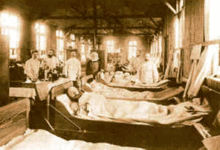Meno Burg
[Note 2] Burg was already a government employee, when the new Prussian civil rights legislation for Jews (German: Edikt vom 11.This law naturalised Jewish inhabitants of Prussia as Prussian citizens, a franchise established in 1810 when doing away with the prior estates (nobility, serfs, burghers, Huguenots, etc.[6] Burg was awaiting his final exam at the Prussian Academy of Arts in Berlin, when he volunteered on 14 February 1813 for the military service to fight for 'Prussia's freedom and rebirth', as he put it.After only a few days, he was discharged from this unit on the grounds that Jews were "under the existing laws and the prevailing circumstances" not allowed to serve in the Guard.State Chancellor Karl August von Hardenberg, usually a supporter of equal rights for the Jews, left Burg's two requests for re-enlistment in the Guard unanswered.However, the promotion was vetoed by the base commander (German: Platzkommandant) Captain Karl Moritz Ferdinand von Bardeleben,[Note 3] stating that "as long as (he) had something to say, no Jew shall be officer in the artillery".[Note 5] Burg became finally second lieutenant on 18 August 1815 and was transferred to the First Artillery Brigade (East Prussia) in Danzig as a company officer.Since 1816 as an instructor at the United Artillery and Engineer School (German: Vereinigte Artillerie- und Ingenieurschule) in Berlin, Burg's principal subject of instruction was drawing and geometry, on which science he wrote a text-book that attained great popularity, being frequently republished and translated into several languages.It is noteworthy that Burg received his promotion, while other Jewish volunteers, who claimed their legitimate rights to employment in the civil service, had been rejected because of their faith.[17] On 6 December 1830 Burg had to learn, that the King did not even want to appoint him to the rank of a captain of the army, because he had not attained "the salvation of the Christian faith".[Note 8] In the Pre-March Era it needed a new chief of the artillery, Prince Adalbert of Prussia, and a new king Frederick William IV to remove the injustice of the discriminatory Waffenfarbe (German for: "corps [or troop-function] color").[1][33] During the years 1847 to 1849 Burg was engaged in writing his autobiography, which was published in 1854 in Berlin under the title Geschichte meines Dienstlebens ("history of my life in service").








BerlinPrussiaOrder of the Red EaglePrussianfield officerPrussian ArmyMargraviate of BrandenburgGymnasium zum Grauen KlosterSalomo SachsBauakademiefield-surveyorFrederick William IIFrederick William IIIPrussian Academy of ArtsBreslauKarl August von HardenbergartilleryFree CorpsEast PrussiaDanziggeometryPre-March EraAdalbert of PrussiaFrederick William IVWaffenfarbeOtto von BismarckVereinigten LandtagMarch Revolution of 1848Wolfgang StraßmannWerner von SiemensWayback Machine